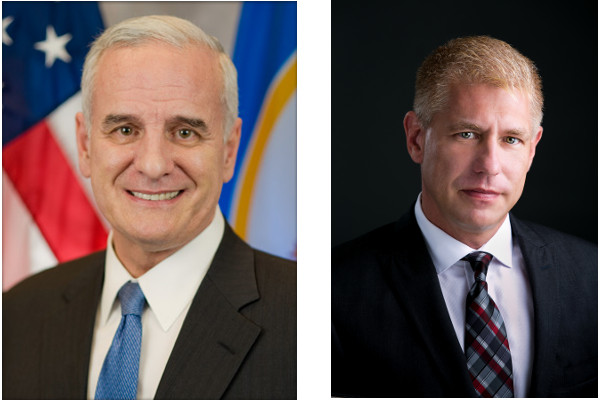 SAINT PAUL, Minn. – When Minnesota Governor Mark Dayton signed bill number SF 2554 back in May, he did so without the fanfare that so often accompanies the signing of legislation.
SAINT PAUL, Minn. – When Minnesota Governor Mark Dayton signed bill number SF 2554 back in May, he did so without the fanfare that so often accompanies the signing of legislation.
No ribbon was cut, no press conference was called and the press release issued to announce the occasion bore the mundane title “Governor Dayton Signs Six Bills into Law.”
The description of SF 2554 contained in the release was as brief as it was vague: “This bill requires collection of information on the connection between pornography and sex trafficking and authorizes expansion of the penalty assessment. This bill passed unanimously in both legislative bodies.”
Unlike so many other bills which involve pornography, SF 2554 seemed to avoid the radar of the mainstream media – and just about all other media, for that matter. Weeks after it was signed into law, a smattering of articles appeared on religious and socially-conservative news sites such as OSV.com (“Our Sunday Visitor”) under headlines like “New law links pornography, human trafficking.”
As someone who regularly covers legal issues relating to adult entertainment, I was somewhat surprised by the lack of media splash made by a law which “links pornography” to human trafficking. Unsurprisingly, when I dug further into SF 2554, what I found wasn’t a law which links porn to human trafficking, but an embedded assumption that the two are fundamentally linked – and this same assumption was now being introduced into an existing state law by the changes to statutory language made under the bill.
As is often the case with legislation which simply modifies an existing law (or set of laws), reading the text of SF 2554 doesn’t do much to enlighten the reader as to its impact or scope.
The description of SF 2554 is as follows: “A bill for an act relating to public safety; requiring collection of information on the connection between pornography and sex trafficking; expanding the authorized penalty assessment to include additional crimes; amending Minnesota Statutes 2016, sections 299A.785, subdivision 1; 609.3241; 609.5315, subdivision 5b.”
When you look at how the bill modified the sections of code in question, it simply adds “possession of pornographic work involving minors” and “harmful materials; dissemination and display to minors prohibited” to a list of crimes which the Minnesota government requires specified governmental and nongovernmental agencies to report on. Specifically, the agencies are required to report “the numbers of arrests, prosecutions, and successful convictions of traffickers and those committing trafficking-related crimes.” (The two crimes are also added to the list of offenses which carry a financial penalty, the revenue from which goes to a fund which supports various agencies and programs ostensibly designed to combat sex trafficking.)
In other words, what this law does to “link” pornography to human trafficking simply is to declare such a link exists.
Curiously, while the bill’s description references the “connection between pornography and sex trafficking,” suggesting a connection between the consumption of legal adult entertainment and sex trafficking, the crimes specified in the language of the statute are possession of child pornography and the display and/or distribution of pornography to minors.
If you look at how the term “sex trafficking” is defined under the Trafficking Victims Protection Act, you’ll see it is described as “the recruitment, harboring, transportation, provision, obtaining, patronizing, or soliciting of a person for the purpose of a commercial sex act.”
Clearly, simply watching a pornographic video involves none of these actions. Even if one argues that creating pornography constitutes such activities (which is a tough argument to make in court, in light of People v. Freeman), surely merely watching porn still doesn’t qualify.
If the new law doesn’t require agencies to collect and report on the simple possession of pornography, and the crimes it does collect information on involve not pornography but child pornography and the ‘grooming’ of children for sexual abuse by illegally showing them pornography, why does the rhetoric surrounding the law (muted thought it has been to date) suggest the law links porn, writ large, to sex trafficking?
In considering that question, my conclusion was the entire purpose of the new law was to collect information on crimes unrelated to legal adult entertainment, then use that data to further demonize the adult entertainment industry.
Maybe I was missing something, though. Maybe there was some other purpose to this law which had escaped my reading of it. I decided to reach out to attorney and First Amendment expert Larry Walters to get his take. (Spoiler alert: It’s not that different from my own.)
“This legislation appears to be an effort to push the narrative that adult media is somehow linked to sex trafficking – a correlation that has never been successfully established,” Walters said. “Specifically including the undefined term ‘pornography’ as the only specifically-identified ‘social factor’ that contributes to and fosters trafficking is concerning, from a free speech perspective.”
And what makes it so concerning from a free speech perspective?
“The records generated under this mandate may be used in the attempt to impose future restrictions on constitutionally-protected speech,” Walters said.
Walters also noted the circularity of the reasoning involved here: Porn contributes to sex trafficking, because the government says it does – and to prove it, here’s some data collected by the government which shows how many porn-related offenses have been committed in furtherance of sex trafficking.
“It is illogical to force government and non-profit agencies to record the association of pornography in these cases, absent any legitimate evidence of a link between adult materials and trafficking,” Walters said. “This effort feeds the unsupported assumption in the law by requiring the creation of additional records tying pornography to sex trafficking.”
Just to underline the absurdity of it all, Walters offered a hypothetical which posits other factors which ‘contribute’ to sex trafficking.
“If the law mandated that agencies note any time that cash, cars, or the internet ‘contributed’ to sex trafficking, it is fair to assume that each of those would frequently be noted,” Walters noted. “But that does not mean that cars, cash, or the internet causes or contributes to sex trafficking.”
Fighting sex trafficking (by which I mean real sex trafficking, not voluntary sex work willfully undertaken by adults who are making decisions about how to use their own bodies, using their own minds) is a worthy and necessary cause. But it’s a fight which won’t be aided by the rhetorical excess of declaring all pornography to be part and parcel of the sex trafficking trade.
If you think it’s an exaggeration to believe the proponents of laws like the one passed in Minnesota consider all porn to be akin to sex trafficking, consider this quote from Jason Adkins, executive director of the Minnesota Catholic Conference, the group which helped the Minnesota legislature draft SF 2554:
“We consider pornography sex trafficking with the camera turned on. I think that’s an important point to drive home to people: When you use (pornography) you’re fostering and nurturing the sex trafficking trade.”
Adkins has every right to his opinion on porn, of course – but as I see it, he does not have the right to so broadly redefine “sex trafficking” as a matter of law. To the extent he has just helped the Minnesota legislature do so, this is something about which sex workers, porn creators, porn distributors, porn viewers and civil libertarians of all stripes ought to be very concerned.












